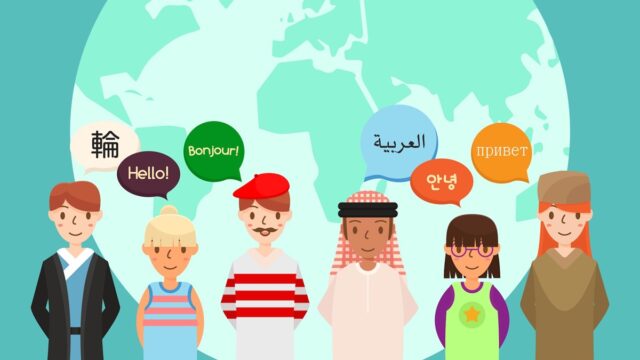There are thousands of translation companies and even more freelance translators all over the world. And in the last decade, these companies and freelancers face the competition of applications that do a decent job at translating text at little to no cost. However, it’s not correct to say that going with software is the best option every time. So how do you decide when to go with a translation company or when to go for another option?
Here’s a quick comparison between the options to give you an initial idea of their differences: a software solution like Babel Fish or Google Translate offers a fast and mostly cheap (free, even) way of translating text or audio, but fall flat when it comes to more complex sentences. Working with a translation company provides professional-quality translated output with fast turnaround times albeit at the expense of being, well, more expensive than your other options. However, established companies such as Tomedes, Gengo, or Lionbridge offer the added advantage of having specific industry specializations and additional translation requirements such as providing certification or notarizing translated documents. Freelancers are kind of the in-between option which promises better quality than software at a lower cost than with a translation company. I’ll go into further detail on which translation option you should use depending on the specific use cases below.
When You Can Get by with Free Machine Translation Software
Contents
Last decade there was a revolution in machine translation. Big tech companies invested heavily in developing translation software. They recognized, correctly, that quality translations are keys to the successful globalization of documents, conversations, websites, applications, and the companies behind them. Virtually everyone had an interest in expanding markets and audiences by “going global.” Language barriers stood in the way of achieving this goal.
So Google, Microsoft, Apple, Facebook, and Amazon all began investing in translation tools, both as client applications and as APIs which bridged functionality among software programs. All of them leveraged a breakthrough in machine language processing technology, starting in 2015, which applied the Artificial Intelligence science of neural networks to improve radically the quality of automated translation.
The resulting APIs and applications are certainly useful in casual conversation, to make use of foreign language articles, and even when translating routine and structured texts in a customer service context or for internal communications within an organization. Why not? They’re super quick, easy, and free. As a frequent traveler, these apps are invaluable when in foreign countries, conversing with people speaking a different language, and making sense of menus and street signs. Despite the convenience, though, free machine translation software has its limits.
When Should You Work with Freelance Translators
Individual freelancers are fully capable of delivering high-quality translation solutions. Most translation companies are economically viable because they work efficiently with a network of freelance translators rather than paying an in-house staff of linguists. Few freelance translators work exclusively with one agency. Most can be hired directly, often at a lower rate than available through a translation agency.
Working with freelance translators makes sense when you are dealing with small, fast-turn projects in a single language, especially a language you cannot find among your friends and colleagues. Where do you find them? Try freelance marketplaces like Upwork, Freelancer.com, and Fiverr. Or try language-focused marketplaces like ProZ. Here you can post your job as a client and collect bids from respondents. You can check profiles and portfolios, compare ratings and rates, read past client reviews, and reach out to them with your questions. All this comes at no risk and no cost. Then you broker a deal, using the marketplace as “middleman” which holds your payment in escrow till you decide the job has been completed successfully. Voila! Quality translation at an efficient cost and (usually) fast turnaround.
If things go wrong, the marketplace can serve as a mediator and, if necessary, certainly.. But in my experience, the process typically flows smoothly and you end up with the cost-efficient translation you sought. One tip: seek out translators in pairs: one to check the work of the others and to serve as a backup in case the first one flakes.
Cost is a key reason for working with freelance translators. Most translators, and translation agencies, charge by the word. If you look in the freelance marketplaces, you’ll find translation rates ranging from $0.01/word to $0.20/word or more. The average is somewhere in the middle, with the choice of language pair, document type, and urgency of delivery affecting the final cost. Always seek a translator with mother-tongue fluency in your target language. Don’t skimp and hire a cheap translator from Jodhpur or Lagos when you require a scholarly document in Estonian English or a specialized tech post in “SiliconValese.” Only native linguists will suffice.
When is it Wise to Work with a Translation Company?
While cost-efficient translation may be your goal, don’t sacrifice quality, especially in published works. Better to pay a little (usually 20% to 50%) extra and get a quality translation that native readers will perceive as natural. Another factor is complexity. If you require translations in multiple languages, say for a website localization project, it would be madness to seek out translators in each language.
A translation company can offer a one-stop-shop. Typically, you will be assigned a personal account manager to liaise between you and the language specialists and translators that the agency assigns to your project. You may pay more for this management layer, but your time is valuable too. A translation company, unlike most freelancers, can offer certified translations, essential for official documents. Translation agencies also will often guarantee the accuracy of their translation for months or more even after delivery. These agency advantages give you peace of mind, save you time, and ensure that readers never get lost in translation.


